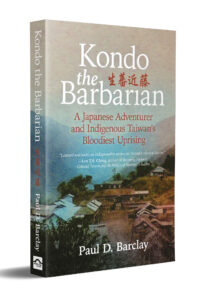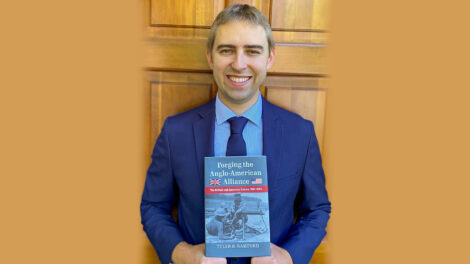Prof. Paul D. Barclay announces new book, Kondo the Barbarian
By Bryan Hay
 Paul D. Barclay, professor of history at Lafayette College
Paul D. Barclay, professor of history at Lafayette College
Kondo the Barbarian, published by Camphor Press
Released May 30, 2023
Kondo the Barbarian, a summary:
Kondo the Barbarian: A Japanese Adventurer and Indigenous Taiwan’s Bloodiest Uprising is a narrative account of an important but overlooked aspect of Japanese colonial rule in Taiwan. It focuses on a 1930 rebellion and its brutal suppression by the Japanese military. On the one hand, Kondo the Barbarian is a portrait of a Japanese adventurer who married into an indigenous Taiwanese family, rendered in his own words via my translation of his memoir. On the other hand, it is a history book, based on archival research that sheds light on the cultural clashes and sporadic violence that characterize the history of Indigenous peoples and nation-states in the modern era.
Where is it available?
The book is available via Amazon.com and Camphor Press’s website, in Kindle, ebook, hardcover, and paperback versions, and at the Lafayette College Store as a paperback.

Kondo the Barbarian
Why did you write this book, and why should people at Lafayette and beyond read it?
I wrote this book with undergraduates and history buffs in mind—it is a nontechnical work, meaning that I avoided the use of jargon and long discussions of other scholarship. I wanted people who are interested in the history of Japan, Taiwan, or Indigenous peoples to have a reliable and readable account of events in the part of the world I teach courses about, travel to, and even call home when I’m not in Easton.
How will this research impact your work and/or classroom at Lafayette?
Firstly, unlike the more dense and technical writings I’ve published, I can assign this book in my survey courses about modern East Asian history. If a book like this already existed, I wouldn’t have needed to write it. The inspiration was a blockbuster Taiwanese film called Warriors of the Rainbow: Seediq Bale. Now my students can learn from this film without having to rely on dramatizations and oversimplifications for their historical knowledge. More generally, I believe that dramatized history is a good entry point into the history of unfamiliar places, but films, novels, and comics should be paired with researched accounts.
Is there anything else we should know?
The press I worked with specializes in books about East Asia that are written for nonacademics; they are especially strong on Taiwanese topics. Camphor Press produces affordable books, which is important, but even better, its editorial team provided me substantive feedback on readability and details about Taiwanese geography. With advances in book publishing and marketing technology, I think more scholars are considering the alternatives to university presses, which charge higher prices and cannot necessarily provide authors with support outside of copy editing and cover design.

